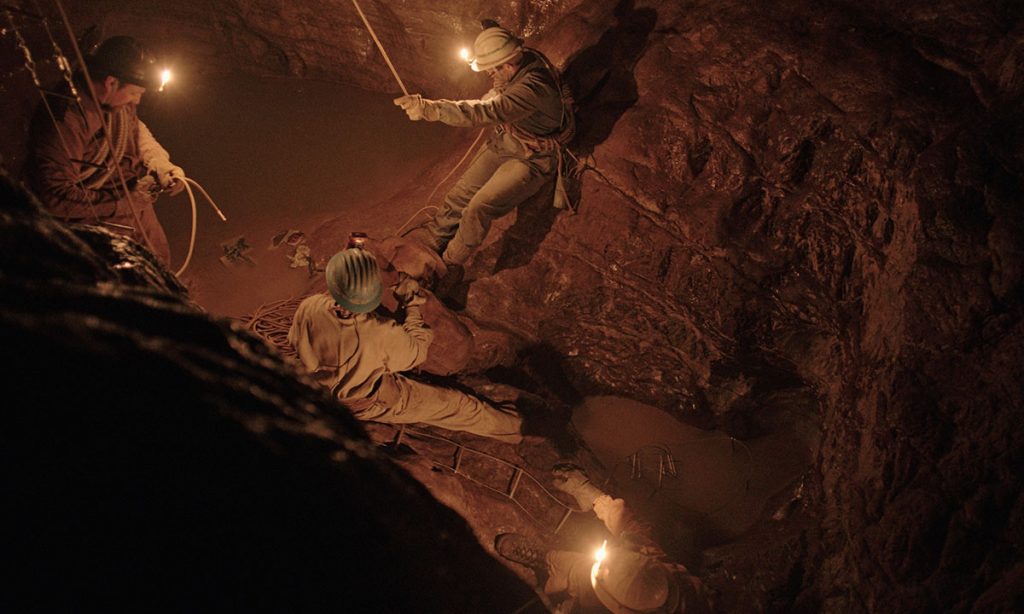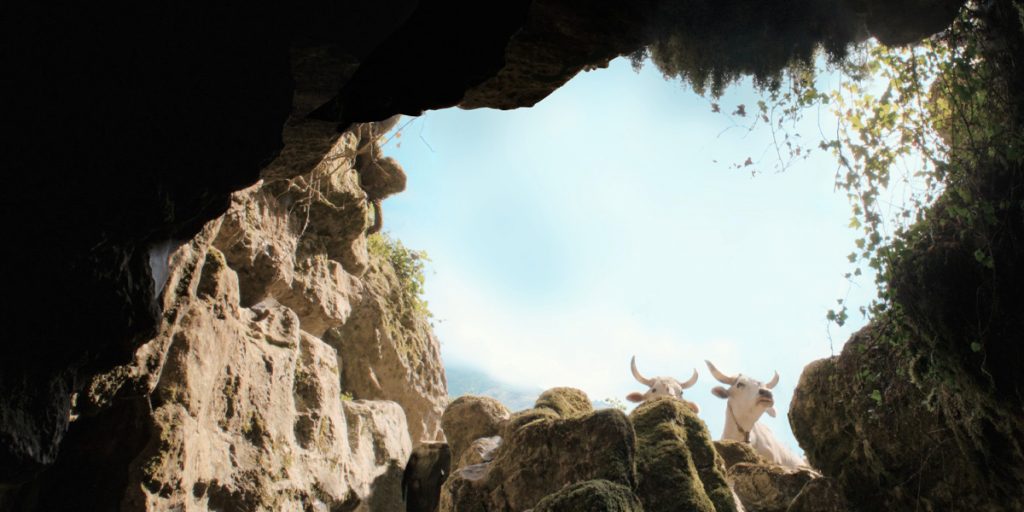Veering from the magical to the mundane, Il Buco is a missed opportunity to really capture the wonder and adventure of a real-life cave expedition.
Michelangelo Frammartino’s (Le Quattro Volte) latest directorial outing, Il Buco (meaning ‘The Hole’ in English), has moments of such intense beauty that you will truly feel transported from the dark recesses of the cinema to the wide, rolling expanses of Calabria in Southern Italy. Frammartino’s measured and static direction, coupled with the inventive cinematography of Renato Berta (Au revoir les enfants), ensures Il Buco is never an unpleasant film to look at and is always captivating in its imagery. There is style, here, but ultimately not enough substance, and, even at a relatively short runtime of 93 minutes, Il Buco can feel like a bit of a slog and a slightly humdrum journey with a sprinkling of magical moments. For a film capturing a slice of Italian history which has such a mystical, inspirational quality, it never quite lifts off into the adventurous odyssey it could so well be.
Said slice of history refers to a small group of people in the early 1960s who travelled to the untouched lands of Calabria – and more specifically the untouched caves beneath – to explore what was then the deepest cave in Europe. Il Buco follows them from their arrival in the small village nearby right up to the end of their expedition, when they reached the bottom of the cave (a fascinating 700 metres below Earth). There is an enchanting quality – at least in the opening scenes – to their everyday lives that we witness, as we observe them in their base camp doing normal things like cook, play games and sunbathe, all of which is juxtaposed with their brave descents into the unknown darkness of Bifurto Abyss. The issue that begins to arise with Il Buco is that speleology (the scientific study of caves) is arguably not that riveting to watch (after a short time, that is) and is perhaps more rewarding and exhilarating to actually take part in. Frammartino never quite captures the dangers and unknowns of the numerous descents, nor the momentous sense of exploration or discovery. The camerawork – long shots that are largely static and stay in place for minutes at a time – do little to place the audience directly into events, instead creating a surprisingly detached atmosphere.
Intercut with the scenes involving the speleologists is the life of an elderly shepherd living close to the cave. Il Buco charts his quiet days of herding cows in the luscious Calabrian hills and mountains before his health declines and he is cared for by friends from the village. The shepherd’s solitary, peaceful life intertwines with the speleologists from afar but the connection remains too tenuous to ever really feel solid, and instead Il Buco begins to play out like two separate films. Symbolic connections – such as the fading light of a speleologist’s headtorch in the darkness of the cave cut with the shepherd’s slow breathing as he lies in bed – hint at something special but moments like this are ultimately too few and far between. Frammartino also captures a wonderful moment early on in Il Buco as he follows a group of children, equipped with a single headtorch, running through the village streets at night, screaming with delight and wonder at their lit-up surroundings. It juxtaposes well with the speleologists’ own, more serious adventure and it’s a shame that this sense of discovery – perhaps the most important thing to highlight in a film like this – never quite reaches its potential.

As a portrayal of mother nature though, Il Buco is a very special film. Berta’s cinematography can’t be praised enough, in its glorious snapshot of not only the wondrous vistas and landscapes but also the interiors of the cave itself. Berta has spoken about how he needed to use eight different apertures in some shots and that natural lighting was used within the caves to only show what the speleologists were seeing from their headtorches. It would be a challenging shoot even for someone of Berta’s calibre but he captures the events on screen in staggering detail. The overreliance on long, static shots does hinder Il Buco though and perhaps more close-ups of the speleologists would have contributed further to the claustrophobic atmosphere. But add in some intensely naturalistic sound design by Simone Paolo Olivero (Le Quattro Volte), which captures the water dripping and hollow sounds of the cave as well as the gentle wind and birdsong of the aboveground, and Il Buco really is – if nothing else – a sumptuous nature documentary.
Reading up about Il Buco after watching it highlights its shortcomings and is in many ways more captivating than the film itself. This small team of speleologists turned away from the economically prosperous North and instead looked to this untouched landscape in the South, achieving a feat at odds with the simultaneous construction of what was then Europe’s highest building. This juxtaposition of man and nature is never quite captured effectively by Frammartino on screen which leaves a certain frustration behind. In the most reductive sense, Il Buco is very much style over substance, although many won’t mind when the style is so achingly gorgeous. Others though will find the lack of weight behind proceedings dissatisfying and the pacing too slow. Ultimately, Il Buco feels very much lost in its own cave, flickering light onto moments of beauty and symbolism but for the most part shrouded in the darkness of mundanity.
Il Buco will be screened at the London Film Festival on 14-17 October, 2021. The film was released in Italian cinemas on 23rd September, after winning the Special Jury Prize at the Venice Film Festival.

